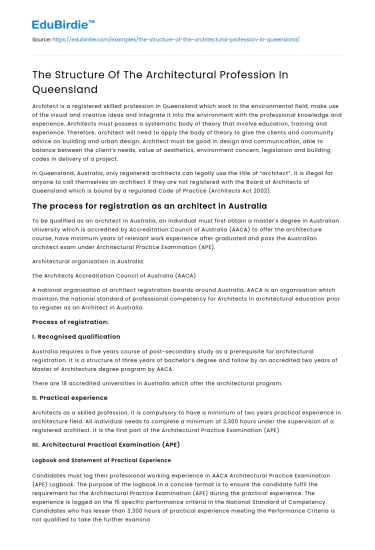Architect is a registered skilled profession in Queensland which work in the environmental field, make use of the visual and creative ideas and integrate it into the environment with the professional knowledge and experience. Architects must possess a systematic body of theory that involve education, training and experience. Therefore, architect will need to apply the body of theory to give the clients and community advice on building and urban design. Architect must be good in design and communication, able to balance between the client’s needs, value of aesthetics, environment concern, legislation and building codes in delivery of a project.
In Queensland, Australia, only registered architects can legally use the title of “architect”, it is illegal for anyone to call themselves an architect if they are not registered with the Board of Architects of Queensland which is bound by a regulated Code of Practice (Architects Act 2002).
Save your time!
We can take care of your essay
- Proper editing and formatting
- Free revision, title page, and bibliography
- Flexible prices and money-back guarantee
The process for registration as an architect in Australia
To be qualified as an architect in Australia, an individual must first obtain a master's degree in Australian University which is accredited by Accreditation Council of Australia (AACA) to offer the architecture course, have minimum years of relevant work experience after graduated and pass the Australian architect exam under Architectural Practice Examination (APE).
Architectural organisation in Australia:
The Architects Accreditation Council of Australia (AACA)
A national organisation of architect registration boards around Australia. AACA is an organisation which maintain the national standard of professional competency for Architects in architectural education prior to register as an Architect in Australia.
Process of registration:
I. Recognised qualification
Australia requires a five years course of post-secondary study as a prerequisite for architectural registration. It is a structure of three years of bachelor’s degree and follow by an accredited two years of Master of Architecture degree program by AACA.
There are 18 accredited universities in Australia which offer the architectural program.
II. Practical experience
Architects as a skilled profession, it is compulsory to have a minimum of two years practical experience in architecture field. All individual needs to complete a minimum of 3,300 hours under the supervision of a registered architect. It is the first part of the Architectural Practice Examination (APE).
III. Architectural Practical Examination (APE)
Logbook and Statement of Practical Experience
Candidates must log their professional working experience in AACA Architectural Practice Examination (APE) Logbook. The purpose of the logbook in a concise format is to ensure the candidate fulfil the requirement for the Architectural Practice Examination (APE) during the practical experience. The experience is logged on the 15 specific performance criteria in the National Standard of Competency. Candidates who has lesser than 3,300 hours of practical experience meeting the Performance Criteria is not qualified to take the further examination of APE.
Statement of Practical Experience used as an evidence of contentment of the practical experience requirements and as a reference showing some of the candidate’s selected projects that best illustrate the application of Performance Criteria for Assessors to view and refer to in the APE Part 3 examination. The statement should consist and begin with a summary CV usually in a maximum of one page with the overall view of the candidate’s professional experience. The statement should come in a maximum of 2,000 words if it is logged under the supervision of an architect, while for the experience which is not logged under the supervision of architect, it should come in 3,000 words of statement.
The Logbook and Statement of Practical Experience are submitted with the applications directly to the State or Territory architect registration board which the applicant wishes to practice and the decision on admission to the examination is made by the respective architect registration board.
National Examination Paper (NEP)
After passing the Part 1 requirement, the candidates are now eligible to sit for part 2 National Examination Paper. National Examination Paper is to provide a reliable and effective test of professional knowledge and application related to performance criteria in the National Standard of Competency for Architects.
The National Examination Paper is a 75 minute ‘closed book’ scenario computer-based exam. It consists of nine scenarios. Each scenario comprises 5 multiple choice questions with each multiple-choice question having 4 responses with one correct response.






 Stuck on your essay?
Stuck on your essay?

